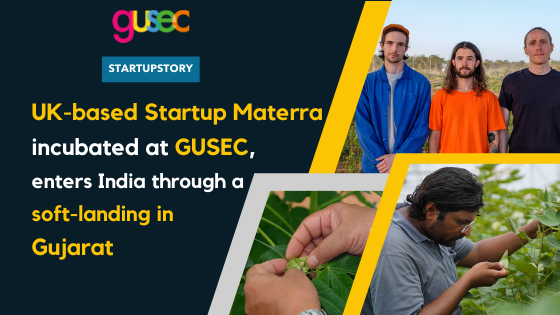UK-based Startup Materra, incubated at GUSEC, enters India through a soft-landing in Gujarat

AHMEDABAD, JANUARY 11, 2022. Bringing climate resilience in cotton cultivation, London-based Materra incubated at Gujarat University Startup & Entrepreneurship Council (GUSEC), is addressing challenges faced by cotton farmers in India through precision agriculture and controlled environments. The startup has recently set up an Indian subsidiary to carry out operations in the country.
Founded by Edward Brial, Edward Hill & John Bertolaso, the startup, through technology & research-powered greenhouses help Indian farmers grow the Extra Long Staple (ELS) cotton, helping them earn a better income. Materra also ensures that garment brands utilising cotton are aware of the environmental footprint the crop leaves, establishing transparency and enabling accountability.
Speaking of expanding operations in India, co-founder Ed Hill says, “At Materra we follow the belief that there is no universal remedy for all ills in farming. From one location to another there can be so much variation that a solution on one farm can cause damage on another. That is why we are very excited to be on the ground in Gujarat and able to interact with local farmers and the ecosystem they live in. This gives us the amazing opportunity to learn from them, building solutions that will work for them in their local context”.
Materra is also in the midst of a two-year pilot project in collaboration with pioneers of sustainable fashion viz. Fashion for Good, Kering, PVH Corp. and Arvind Limited. “We see Materra’s solution as playing an integral role in our future sourcing strategy. Their technology combines precision agriculture and controlled environments to create a radically resource-efficient cotton farm. This results in reductions in water, land use and carbon emissions, as well as pesticide removal. We are excited to be collaborating with our fellow Fashion for Good partners on this consortium project and look forward to scaling this solution in our supply chain.” says Abhishek Bansal, Head of Sustainability, Arvind Limited.
Addressing the emergent need for innovation in cotton farming, co-founder John Bertolaso remarks, “Considering that cotton is the most widespread non-food crop worldwide with more than 100 million farmers cultivating it – it still isn’t talked about enough. We identified the need for innovation in the space and through Materra, aim to open avenues of communication about the social and environmental impact of cotton farming. This is important, particularly now – when we’re beginning to see the adverse effects of climate change which are only bound to aggravate.”
India accounts for 22% of cotton production – the largest in the world. Yet, the ELS cotton it produces falls immensely short of the demand. “India’s aggressive climate makes it hard for farmers to grow higher-quality cotton. Through greenhouse systems, we create the ideal environment required by the crop, protecting it from damage caused due to extreme fluctuations in weather,” says Hill, Chief Science Officer at Materra. Crops grown under these greenhouses and with the expert know-how provided by the startup are sold as Materra™ Cotton.
“It was traditionally thought that infrastructural hardware is hard to install in countries with lack of talent and gaps in the supply chain. While working with a startup in Kenya, Brial realised that’s not true and how a slightly more hardware-intensive approach could benefit farmers,” says Hill.
Materra aims to develop climate resilience through agricultural solutions. “As a result of two years of testing the solution that we’re still actively developing, we’ve witnessed a significant reduction in usage of resources like water, nutrients, pesticides and increase in the yield and quality. Materra Cotton uses up to 80% less water compared to global baselines, with a 2-4 times increase in yield If we can crack the solution for cotton in India, our solutions will undoubtedly be transferable to other crops in other places as well.” John says.
Hill says that there is a painful disconnect between brands, consumers and farmers owing to the lack of education about cotton and the issues surrounding it. He says, “While cotton is typically grown in lower to medium income nations, products manufactured out of it are sold in higher-income nations who don’t bother where their raw materials come from. Investors and brands working with cotton for more than 20 years have little to no idea about the environmental footprint the crop leaves behind.” Adding to the same, John says, “This disconnect, however, provides a massive opportunity for us to enable brands to communicate with farmers, allowing brands to paint a complete picture of the footprint cotton leaves behind.”
“Through our zero-day, zero-cost policy that enables startups to avail support without procedural hurdles, we are building a swift landing platform for global startups, providing them with easier access to manufacturing & architectural support for startups, with the least regulatory obstacles. We aim to scale this model in the near future,” said Rahul Bhagchandani, Group CEO, GUSEC.
Speaking of their expectations from the startup ecosystem in India, Bertolaso remarks, “To begin with, it’s been great to have a coworking space to get work done while being on the move. GUSEC is a super-rich network of 300+ startups that we look forward to networking with, besides connecting to policymakers, research groups and the right talent to spread our vision for farmers. We already have a growing team in Gujarat (including Jignesh Bhalala, our Operations Lead) and are looking forward to hiring amazing talent on the ground. ”
“I personally love the level of integration of the Gujarat University campus with the natural world. However, adjusting my diet while I’m here is a major challenge” says Hill.
“Say no more” Bertolaso joins him.
Currently, Materra has a pilot farm in Gujarat and looks forward to expanding its operations in Madhya Pradesh next.




